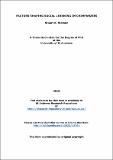Files in this item
Factors shaping social learning in chimpanzees
Item metadata
| dc.contributor.advisor | Whiten, Andrew | |
| dc.contributor.author | Watson, Stuart Kyle | |
| dc.coverage.spatial | 160 p. | en_US |
| dc.date.accessioned | 2018-02-26T10:57:07Z | |
| dc.date.available | 2018-02-26T10:57:07Z | |
| dc.date.issued | 2018-06-29 | |
| dc.identifier.uri | https://hdl.handle.net/10023/12781 | |
| dc.description.abstract | Culture is an important means by which both human and non-human animals transmit useful behaviours between individuals and generations. Amongst animals, chimpanzees live particularly varied cultural lives. However, the processes and factors that influence whether chimpanzees will be motivated to copy an observed behaviour are poorly understood. In this thesis, I explore various factors and their influence on social learning decisions in chimpanzees. In turn, the chapters examine the influence of (i) rank-bias towards copying dominant individuals, (ii) majority and contextual influences and finally (iii) individual differences in proclivity for social learning. In my first experiment, I found evidence that chimpanzees are highly motivated to copy the behaviour of subordinate demonstrators and innovators in an open-diffusion puzzle-box paradigm. In contrast, behaviours seeded by dominant individuals were not transmitted as faithfully. This finding has important implications for our understanding of the emergence of novel traditions. In my second experiment, I found that some chimpanzees are highly motivated to relinquish an existing behaviour to adopt an equally rewarding alternative if it is consistently demonstrated by just one or two individuals within a group context, but not in a dyadic context. This contrasts with prior studies which argue that chimpanzees are highly conservative and may hint at a hitherto unrecognised process by which conformity-like behaviour might occur. Finally, I performed a novel type of ‘meta’ analysis on 16 social learning studies carried out at our research site to determine whether individuals demonstrated consistency in their social learning behaviour across experimental contexts. Strong evidence for individual differences in social information use was found, with females more likely to use social information than males. No effect of age, research experience or rearing history was found. This presents a promising new method of studying individual differences in behaviour using the accumulated findings of previous work at a study site. | en_US |
| dc.language.iso | en | en_US |
| dc.publisher | University of St Andrews | |
| dc.rights | Attribution-NonCommercial-NoDerivatives 4.0 International | * |
| dc.rights.uri | http://creativecommons.org/licenses/by-nc-nd/4.0/ | * |
| dc.subject | Culture | en_US |
| dc.subject | Cultural transmission | en_US |
| dc.subject | Social learning | en_US |
| dc.subject | Chimpanzee | en_US |
| dc.subject | Primate | en_US |
| dc.subject.lcc | QL737.P96W28 | |
| dc.subject.lcsh | Chimpanzees--Psychology | en |
| dc.subject.lcsh | Learning in animals | en |
| dc.subject.lcsh | Social learning | en |
| dc.subject.lcsh | Cognition and culture | en |
| dc.title | Factors shaping social learning in chimpanzees | en_US |
| dc.type | Thesis | en_US |
| dc.contributor.sponsor | Templeton Foundation | en_US |
| dc.type.qualificationlevel | Doctoral | en_US |
| dc.type.qualificationname | PhD Doctor of Philosophy | en_US |
| dc.publisher.institution | The University of St Andrews | en_US |
| dc.identifier.doi | https://doi.org/10.17630/10023-12781 |
The following licence files are associated with this item:
This item appears in the following Collection(s)
Except where otherwise noted within the work, this item's licence for re-use is described as Attribution-NonCommercial-NoDerivatives 4.0 International
Items in the St Andrews Research Repository are protected by copyright, with all rights reserved, unless otherwise indicated.


